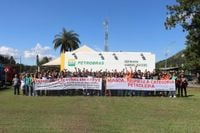On Wednesday, March 26, 2025, workers from Petrobras initiated a unified national strike lasting 24 hours, mobilizing various units across Brazil, including refineries, offshore platforms, and administrative offices. This strike, organized by the Single Federation of Oil Workers (FUP) and the National Federation of Oil Workers (FNP), served as a protest against what the unions describe as the authoritarian management style of President Magda Chambriard, who took office in May 2024.
The primary demands of the striking workers include the full payment of the Profit and Results Participation (PLR) for 2024, the maintenance of the current telework model, and the initiation of effective collective negotiations with management. The discontent among the workers has been exacerbated by a recent announcement from Petrobras regarding a 31% reduction in the PLR value, while the company allocated a staggering 207% of its profits to shareholders, a record high.
In Rio de Janeiro, the Senate Building (Edisen) became the focal point of the protest, drawing hundreds of workers from various units, including the Leopoldo Américo Miguez de Mello Research Center (Cenpes) and Transpetro headquarters. In the afternoon, workers held a march around the Edisen, reinforcing their protest against Petrobras management and demanding a meaningful negotiation table.
In Litoral Paulista, the strike saw significant participation, with the Sindipetro-LP estimating that around 80% of the workforce participated, protesting against the precarious working conditions and cuts to the PLR. In São José dos Campos, workers at the Henrique Lage Refinery (Revap) began their strike a day earlier, engaging in discussions about their core demands, including workforce replacement and defense of the telework regime.
Furthermore, in the Oil Province of Urucu (AM) and Ediman (AM), oil workers joined the national strike. At the Transpetro terminal in Belém (PA), a blockade was organized, highlighting the fight for the rights of outsourced workers and the call to end the 6x1 work schedule. In Aracaju (SE), the Sindipetro Alagoas/Sergipe board held an act in front of the Sergipe Building (Ediser), urging administrative workers to strengthen their collective struggle.
The strike was not just a demonstration of dissatisfaction with management but also a warning shot. "This was merely a warning strike against the company's lack of dialogue with the union movement and attacks on collective rights," said Guilherme Alves, the general coordinator of Sindipetro/MG. He emphasized that if management's intransigence continues, the movement could escalate into an indefinite strike.
Petrobras, however, has stated that there was no impact on oil production and derivatives due to contingency plans that kept essential operations running. Despite the company’s assurances, the unions argue that the management has been disrespecting collective bargaining forums, imposing unilateral changes to labor rights that have been fought for over decades.
Magda Chambriard's tenure as president has not been without controversy. While she was appointed with the promise of balancing the interests of public and private shareholders, her administration has faced accusations of prioritizing shareholder profits over the rights of workers. In 2024, Petrobras recorded a net profit of R$ 36.6 billion, a 70.6% drop from R$ 124.6 billion in 2023, attributed to currency fluctuations and tax agreements. Nonetheless, the company distributed R$ 75.8 billion in dividends to shareholders, raising eyebrows among the workforce.
The unions have pointed out that the management's decision to increase the number of in-office workdays from two to three starting April 7, 2025, was made without proper consultation. They argue this move represents a return to a "culture of fear" and a disregard for collective negotiations that have historically secured workers' rights.
The current labor unrest reflects a broader struggle within Petrobras, as workers demand not only fair compensation but also a dignified working environment that respects their contributions. The unions have laid out clear demands, including the immediate hiring of more staff to alleviate the burden on existing employees and the suspension of the Petros Deficit Settlement Plans (PEDs), which impose additional contributions on retirees to cover fund deficits.
As the strike unfolded, the unions reiterated their commitment to evaluating the outcomes of the 24-hour strike to determine their next steps. Should there be no substantial progress in negotiations, the prospect of prolonged strikes looms large on the horizon. The tension between Petrobras management and its workers encapsulates a critical dilemma: balancing the demands of shareholders with the rights and welfare of those who keep the company operational.
Historically, strikes at Petrobras have served as a vital tool for labor advocacy, with this latest mobilization marking the first significant action under Chambriard's leadership. Previous strikes have garnered substantial participation, yet the company has consistently maintained that operations remain unaffected.
As the situation develops, the workers' resilience and unity will be tested against a backdrop of corporate profits and labor rights. The stakes are high, not just for the workers but for the future direction of Petrobras as it navigates the complex landscape of economic recovery and labor relations.








